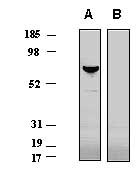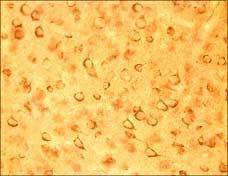Key Documents
PC376
Anti-P2X4 Receptor (373-388) Rabbit pAb
liquid, Calbiochem®
Sign Into View Organizational & Contract Pricing
Select a Size
All Photos(1)
About This Item
UNSPSC Code:
12352203
biological source
rabbit
Quality Level
antibody product type
primary antibodies
clone
polyclonal
form
liquid
contains
≤0.1% sodium azide as preservative
species reactivity
human, mouse, rat
manufacturer/tradename
Calbiochem®
storage condition
do not freeze
isotype
IgG
shipped in
wet ice
storage temp.
2-8°C
General description
Purified rabbit polyclonal antibody. Recognizes the ~65 kDa P2X4 receptor protein.
Recognizes the ~65 kDa P2X4 receptor protein in mouse brain.
Immunogen
Rat
a synthetic peptide (KYVEDYEQGLSGEMNQ) corresponding to amino acids 373-388 of rat P2X4 receptor, conjugated to KLH
Application


Frozen Sections (1-2.5 g/ml)
Immunoblotting (5 g/ml)
Packaging
Please refer to vial label for lot-specific concentration.
Physical form
In 0.05 M sodium phosphate buffer, 0.2% gelatin.
Analysis Note
Positive Control
Mouse brain, rat brain, or SK-N-SH cells
Mouse brain, rat brain, or SK-N-SH cells
Other Notes
A protein database search confirms that this peptide sequence is unique to the P2X4 receptor protein. The signal was completely abolished in immunoblotting by preincubating the purified antibody with blocking peptide at 25 µg/ml. Immunohistochemistry was performed on floating mouse brain sections fixed in 4% paraformaldehyde. Staining was completely abolished by preincubating the affinity purified antibody with control peptide at 10-6M (approximately 2 µg/ml; data not shown). Immunohistochemical staining results correlate well with other independent reports and in situ hybridization studies. Antibody should be titrated for optimal results in individual systems.
Le, K.-T., et al. 1998. Neuroscience83, 177.
Nicke, A., et al. 1998. EMBO J.17, 3016.
Ralevic, V. and Burnstock, G. 1998. Pharmcolol. Rev.50, 413.
North, R.A. and Barnard, E.A. 1997. Curr. Opin. Neurobiol.7, 346.
Radford, K.M., et al. 1997. J. Neurosci.17, 6529.
Buell, G., et al. 1996. EMBO J.15, 55.
Collo, G., et al. 1996. J. Neurosci.16, 2495.
Seguela, P., et al. 1996. J. Neurosci.16, 448.
Bo, X., et al. 1995. FEBS Lett.375, 129.
Lewis, C., et al. 1995. Nature377, 432.
Nicke, A., et al. 1998. EMBO J.17, 3016.
Ralevic, V. and Burnstock, G. 1998. Pharmcolol. Rev.50, 413.
North, R.A. and Barnard, E.A. 1997. Curr. Opin. Neurobiol.7, 346.
Radford, K.M., et al. 1997. J. Neurosci.17, 6529.
Buell, G., et al. 1996. EMBO J.15, 55.
Collo, G., et al. 1996. J. Neurosci.16, 2495.
Seguela, P., et al. 1996. J. Neurosci.16, 448.
Bo, X., et al. 1995. FEBS Lett.375, 129.
Lewis, C., et al. 1995. Nature377, 432.
Legal Information
CALBIOCHEM is a registered trademark of Merck KGaA, Darmstadt, Germany
Disclaimer
Toxicity: Standard Handling (A)
Not finding the right product?
Try our Product Selector Tool.
Storage Class Code
10-13 - German Storage Class 10 to 13
Certificates of Analysis (COA)
Search for Certificates of Analysis (COA) by entering the products Lot/Batch Number. Lot and Batch Numbers can be found on a product’s label following the words ‘Lot’ or ‘Batch’.
Already Own This Product?
Find documentation for the products that you have recently purchased in the Document Library.
Hongxia Chen et al.
Molecular medicine reports, 13(1), 697-704 (2015-12-10)
P2X4 receptor (P2X4R) is the most widely expressed subtype of the P2XRs in the purinergic receptor family. Adenosine triphosphate (ATP), a ligand for this receptor, has been implicated in the pathogenesis of asthma. ATP‑P2X4R signaling is involved in pulmonary vascular
Our team of scientists has experience in all areas of research including Life Science, Material Science, Chemical Synthesis, Chromatography, Analytical and many others.
Contact Technical Service